Orlando Restrepo: "It's Like a Gift My Friends Gave Me"
This interview is part of our “In Their Own Words” series. It has been translated and edited for clarity and readability - nothing else.
Orlando Restrepo is the 72-year-old owner of a juice and fruit stand on the road leading to La Catedral in Envigado, Colombia. Once Pablo Escobar’s prison, La Catedral is now a care home for Envigado’s elderly with few resources. Millions of other Colombian seniors who cannot afford to retire continue to work – Don Orlando is one of them. Yet he remains positive. The fruit stand, made possible with help from his community and strangers, has been his financial and emotional lifeline.
In his own words:
My name is Orlando Restrepo. I’m from Jericó, Antioquia—the land of the Saint Laura Montoya. I’m proud to be from that town.
I’ve lived in Medellín for four or five decades now. These days, I get by with my juice and fruit stand, but for most of my life - 35 years - I worked at the city’s largest wholesale fruit and vegetable market (La Central Mayorista de Antioquia).
My knees and back suffered greatly from the hard labor during that time. I spent years lifting heavy cargo, unloading and loading trucks that arrived at the market. Some were lighter, others were heavier, but it was always an effort, and over time, it took its toll on my body.
Back then, we didn’t have any kind of insurance because we didn’t work directly with employers. Our bosses were the truck drivers who came to load and unload. Once the job was done, they’d pay us directly.
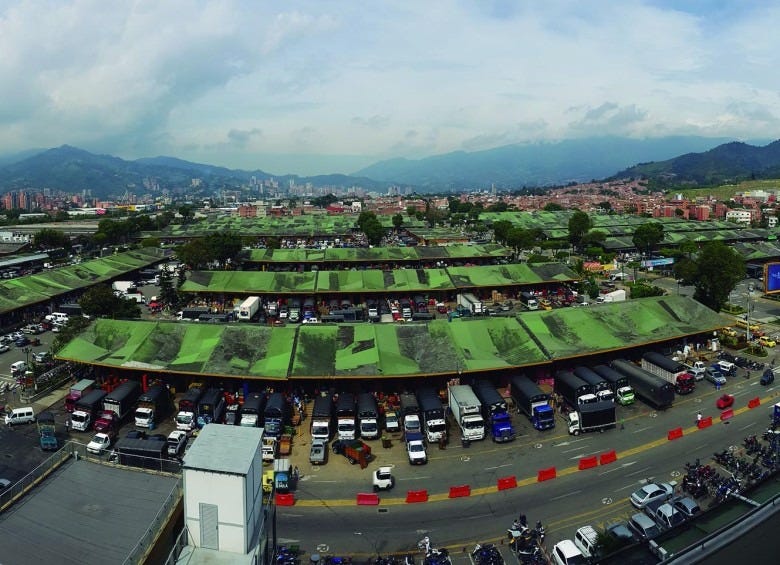
A doctor eventually told me I couldn’t work at the market anymore—no more heavy lifting, no more physical labor. That scared me. I kept asking myself, “what am I going to do now?”
Thank God I had—and still have—many friends at the market. One of them, Darío Tamayo, saw me as reliable. He gave me extra cash, so I would always work his stand. And when I couldn’t work anymore because of my knees and back, he helped me in many ways. He even paid for my surgery and gave me a million pesos a month for rent, utilities, and food.1
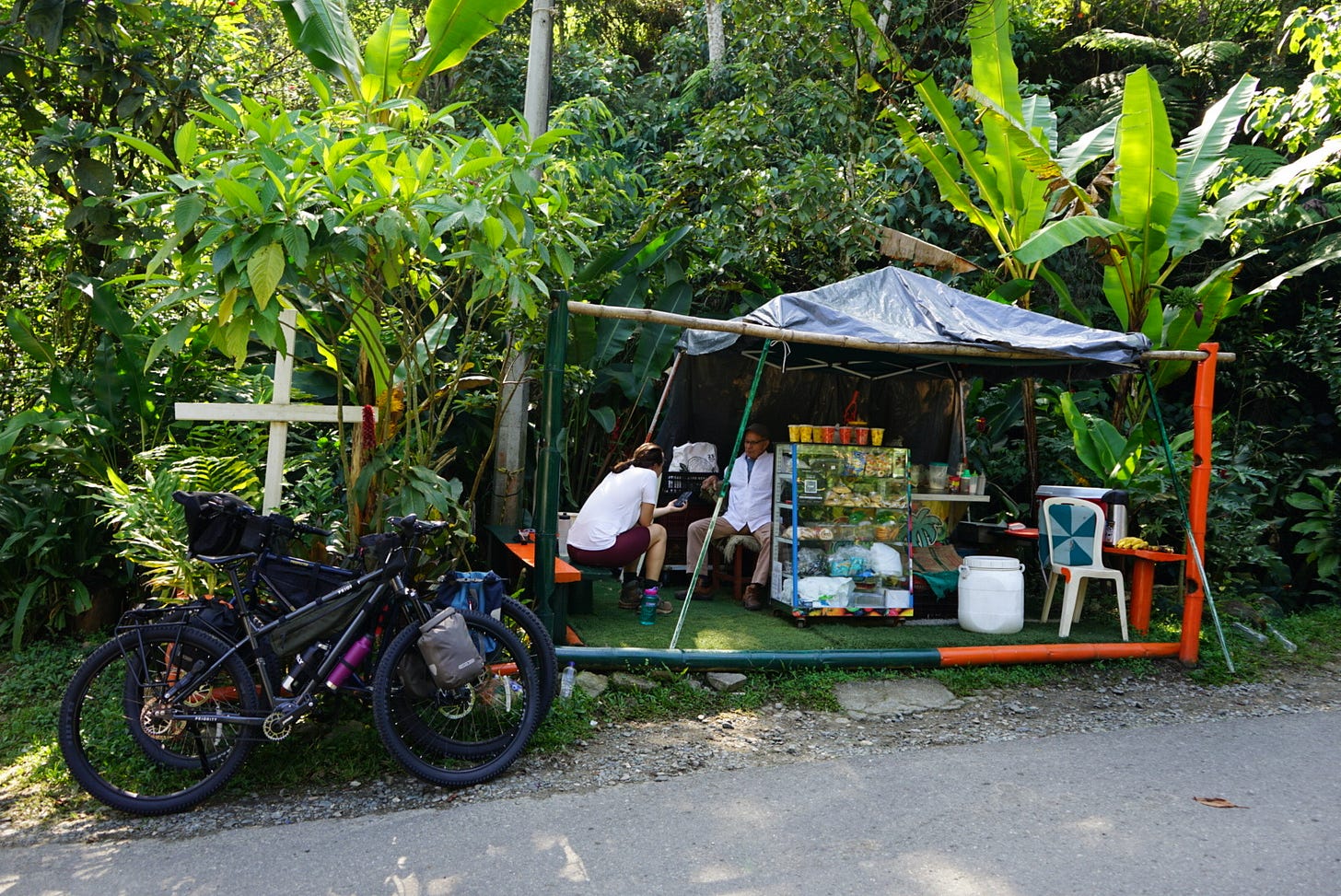
But even with all that help, I fell into despair after a year of being stuck at home, unable to work. You can have all the help in the world, but sitting at home doing nothing? That’s tough.
Once I could walk again, I’d stroll up and down this road. One day, an idea came to me: I’d sell fruit here on the roadside.
I started from scratch. I took a table from my house—an old one you couldn’t even give away—and drilled two holes in it to attach a juicer. I still remember that first morning, setting up at 6 a.m. — I didn’t know where to start.
But then my guardian angel appeared.
He was just a cyclist riding by. I didn’t know him, and he didn’t know me.
“Hey man, since when have you been here?” he asked me.
I said, “I just set up. I don’t even know where I’m coming from or where I’m going.”
“You know, this is exactly what’s been missing here,” he told me. “The only other place to get a juice is way up at La Catedral.”
He rode off on his bike and came back with cups, napkins, straws, honey – everything you need to make good orange juice.
I told him, “I’m sorry, patron, but I don’t have any money.”2
He said, “Don’t worry about it. I admire you—despite your age, you’ve got the spirit to start something new.”
By the time he came back down from La Catedral, I’d sold 50,000 pesos in juice.
So that became my life. It’s like a gift my friends gave me.
As long as my wife was alive, I had a happy life. She helped me a lot even though she had her own job. We were close and took care of things together.
My friend Tamayo was here the day my wife died of COVID-19. My wife, two of my brothers, and a cousin all died around the same time. It’s been nearly four years now. After her death, things changed. I was on the verge of a breakdown. I was alone, locked in the house.
It got to the point that I had to go see a specialist at the Heart Institute.
The doctor asked me, “what’s your issue?”
I told her, “Doctor, the problem is that my wife died.”
She said, “I’m so sorry for your loss—that’s very hard. But I can tell you there’s nothing wrong with your heart. The problem is in your mind. It’s grief. What do you do for work?”
I told her, “I have a fruit stand, but it’s not doing well right now.”
She said, “That will be your best therapy. Go back to your stand, reconnect with your clients and friends. Don’t let yourself stay cooped up in the house. Walk, talk to people. I’ll see you in two months.”
Two months later she said, “you’re doing much better.”
The solidarity of my clients was incredible. I thank God for the good people He’s put in my life. As they say, “Do good, and you’ll see good.” Everything you see here—from the plastic tarp to the cart—I got with the help of the community.
A million pesos was about $650 at the time Orlando Restrepo had to stop working.
Patron is a common greeting of respect in Colombia, meaning “boss”.




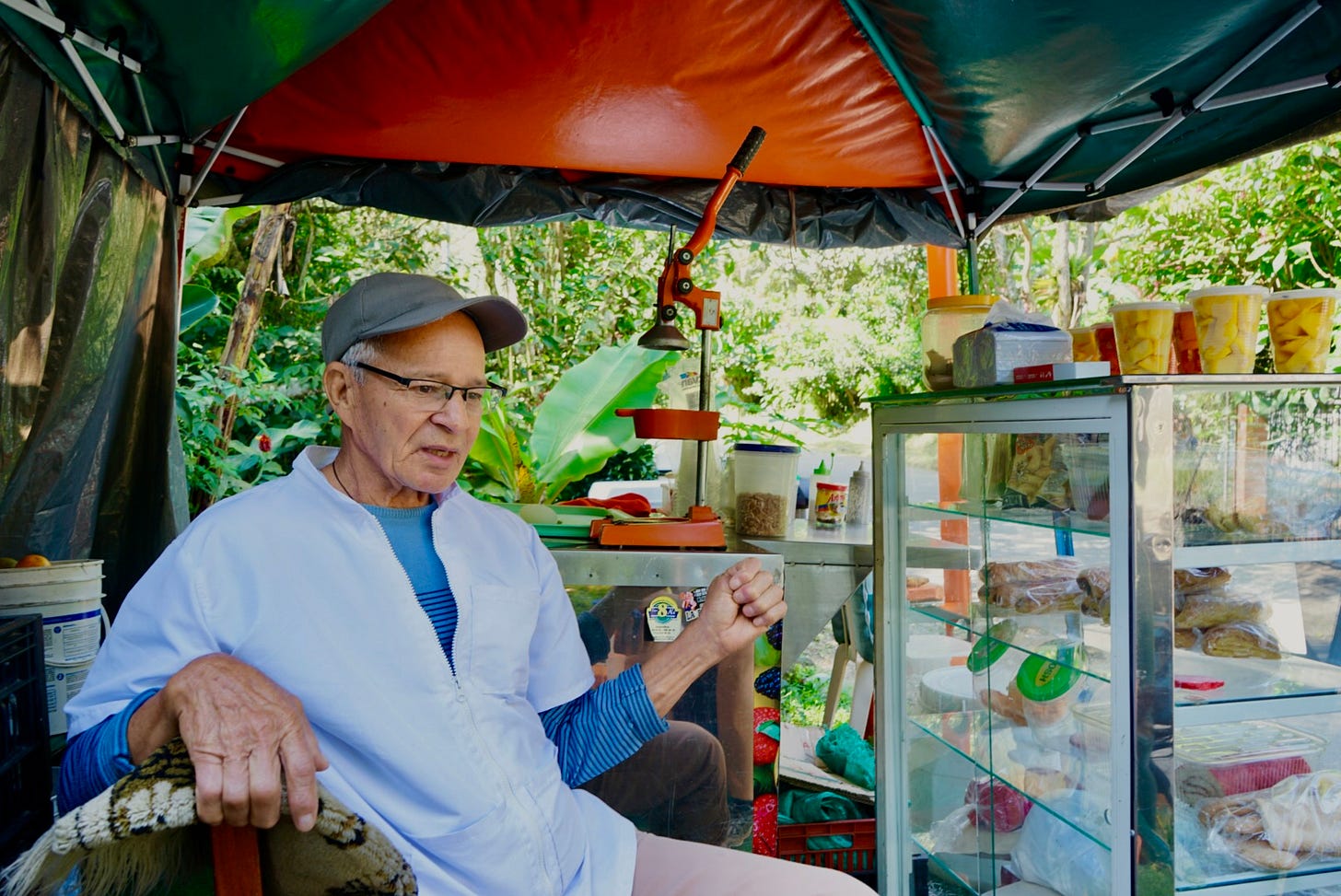
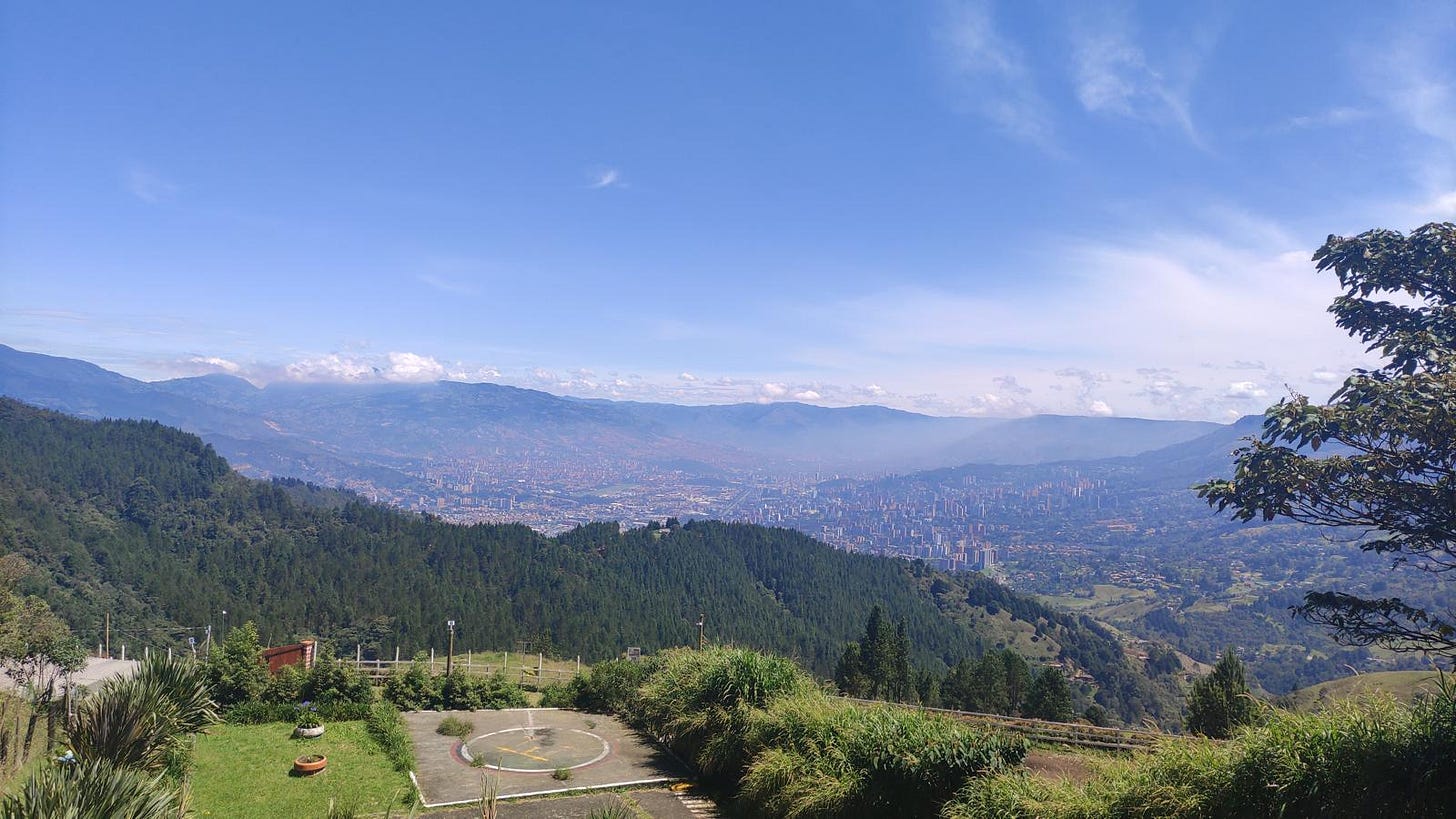
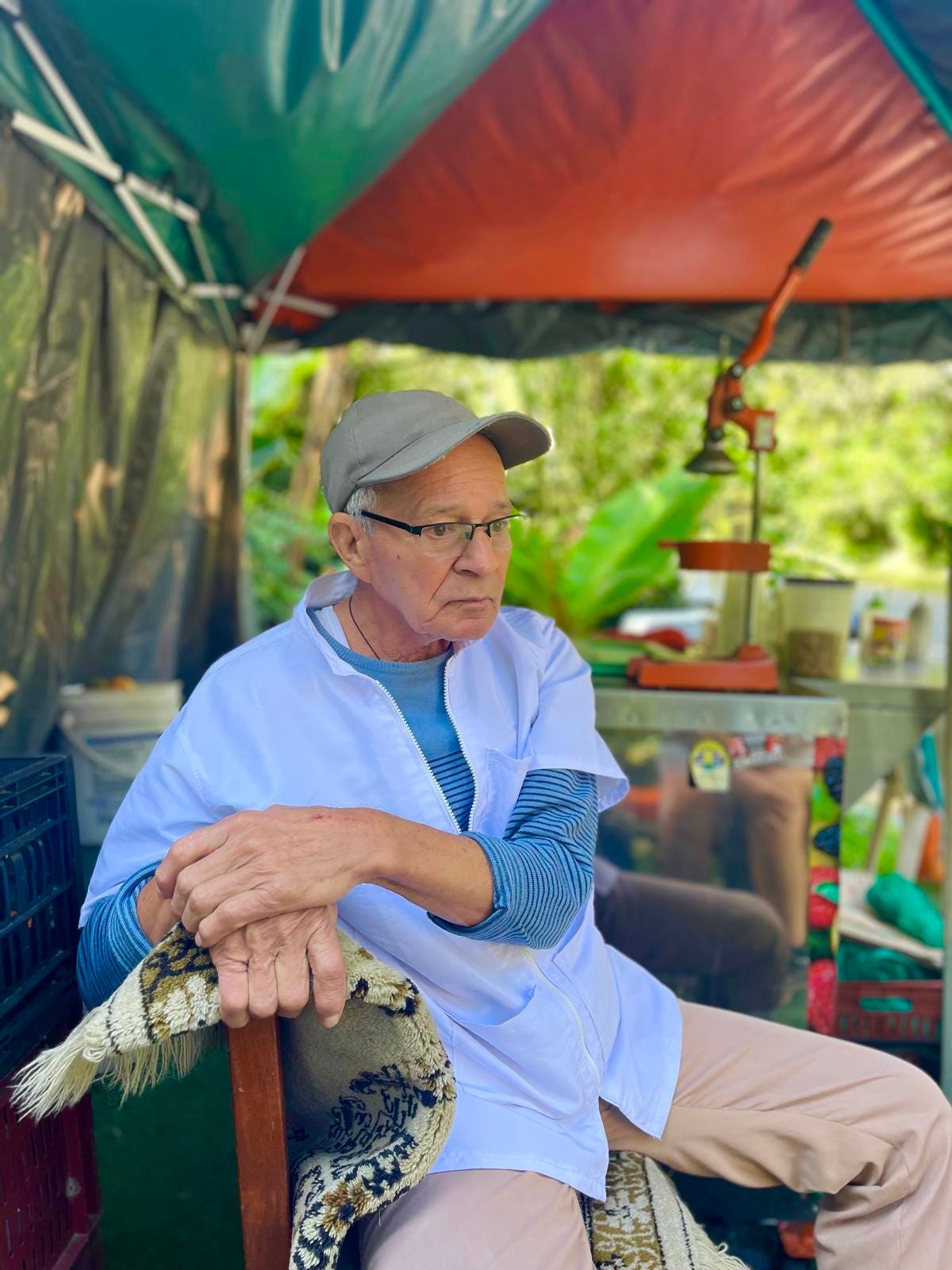
Simple, beautiful, and so human! Love this.